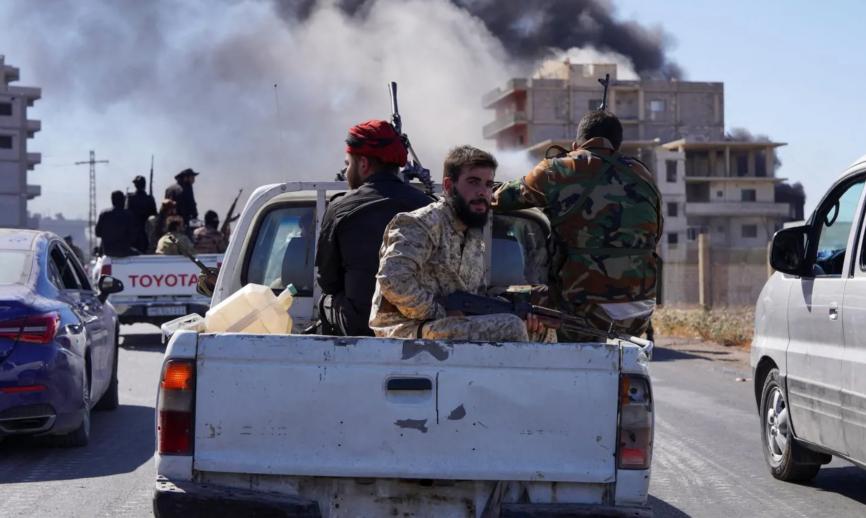Israeli military bombs Syrian convoy as violence erupts in Druze city

The Syrian foreign ministry condemned Israel’s actions, accusing it of being fully responsible for the attacks and their consequences.
Israel has launched airstrikes on Syrian government forces near the city of Suweida, claiming the troops and weapons were intended to be used against the local Druze community.
The strikes followed two days of violent clashes between Druze militias and Bedouin tribes that have left at least 200 people dead, according to the Syrian Observatory for Human Rights (SOHR), a UK-based monitoring group.
The situation in Suweida, a city in southern Syria with a predominantly Druze population, has quickly escalated into one of the deadliest episodes in the region since the fall of Bashar al-Assad’s government.
This marks the first time that Syrian military forces have entered Suweida since Islamist-led rebels overthrew Assad in December.
In a statement, Israeli Prime Minister Benjamin Netanyahu said, “We directed the Israeli military to immediately attack Syrian forces and weaponry sent to the Suweida area that the regime intended to use against the Druze.”
He added that Israel is committed to protecting the Druze due to their historical and cultural ties to Druze communities in Israel and the occupied Golan Heights.
Israel’s Defence Minister Israel Katz echoed the warning, calling the strikes a “clear warning to the Syrian regime.” The Israeli military said it had targeted several tanks approaching Suweida.
The Syrian foreign ministry condemned Israel’s actions, accusing it of being fully responsible for the attacks and their consequences. It said the strikes had killed both military personnel and civilians.
According to SOHR, after Syrian forces entered the city, government troops and allied fighters carried out the summary execution of at least 19 Druze civilians. Twelve of them were reportedly killed at a family guest house. The watchdog further accused the forces of widespread looting and vandalism, including burning civilian homes and shops. Reuters reported that uniformed men were seen setting fire to properties and stealing valuables.
Syria’s defence ministry had earlier announced a ceasefire, saying it had reached an agreement with local leaders to allow security forces to enter Suweida and restore order.
Defence Minister Maj Gen Murhaf Abu Qasra said, “Suweida neighbourhoods will be under the control of Internal Security Forces as soon as combing operations are completed in order to control the chaos, secure return of residents to their houses.”
However, the fragile truce was quickly thrown into doubt. A senior Druze spiritual leader, Sheikh Hikmat al-Hajri, later called on local fighters to “resist this brutal campaign by all available means,” accusing government forces of shelling the city despite the ceasefire.
Earlier in the day, Druze spiritual leaders had initially welcomed the deployment of Syrian forces as a step toward ending the violence and had urged local fighters to cooperate and surrender their weapons.
But tensions quickly flared again, as reports emerged of continued attacks on Druze areas, drone strikes, and mortar fire.
The recent wave of violence began on Friday after the robbery and kidnapping of a Druze merchant along the highway to Damascus.
In response, armed Druze groups surrounded and later seized the al-Maqwas neighbourhood of Suweida, where many Bedouins live. The fighting then spread to nearby towns and villages, with Bedouin tribes reportedly launching counterattacks on Druze areas.
As the death toll rose to 30, Syria’s interior ministry announced plans for the military and security forces to intervene, blaming the situation on the lack of functioning institutions in the province.
The fighting briefly paused after community leaders mediated the release of kidnapped individuals on both sides, but fresh clashes broke out on Monday in the countryside west of Suweida.
SOHR reported that during this period, drones attacked villages, and dozens of injured and dead were brought to local hospitals. Suwayda 24, an activist-run outlet, said the violence continued in eastern Deraa province, close to Suweida.
A Suweida resident described the situation as “catastrophic,” telling BBC Arabic that civilians were fleeing into rural areas to escape the indiscriminate gunfire, even though a curfew had been imposed.
Meanwhile, Axios reported that the United States had urged Israel to halt its military operations in Syria. A US official said Israel had agreed to suspend the strikes by Tuesday evening.
Israel has carried out hundreds of airstrikes across Syria in recent years, targeting what it says are military installations.
It has also deployed troops into parts of the UN-monitored buffer zone along the Golan Heights and neighbouring regions, including Mount Hermon.
Earlier this year, Netanyahu warned that Israel would not “tolerate any threat” to Syria’s Druze communities and demanded the complete demilitarisation of Suweida and two other southern provinces.
He has also identified the Sunni Islamist group Hayat Tahrir al-Sham (HTS), led by interim Syrian President Ahmed al-Sharaa, as a continuing threat. HTS, formerly linked to al-Qaeda, is still listed as a terrorist organisation by the UN and the UK.
As of Tuesday, the Syrian government had not responded to the latest allegations by SOHR, but the video shared by the group showed at least one security officer killed in the Israeli strike.
